Event Management: Success Factors
VerifiedAdded on 2020/04/21
|9
|2263
|159
AI Summary
This assignment examines key factors influencing event management success. It analyzes how event awareness, quality, and image affect visitor revisit intention, drawing upon research and examples. Additionally, it explores the impact of resource allocation and communication methods in ensuring event effectiveness.
Contribute Materials
Your contribution can guide someone’s learning journey. Share your
documents today.
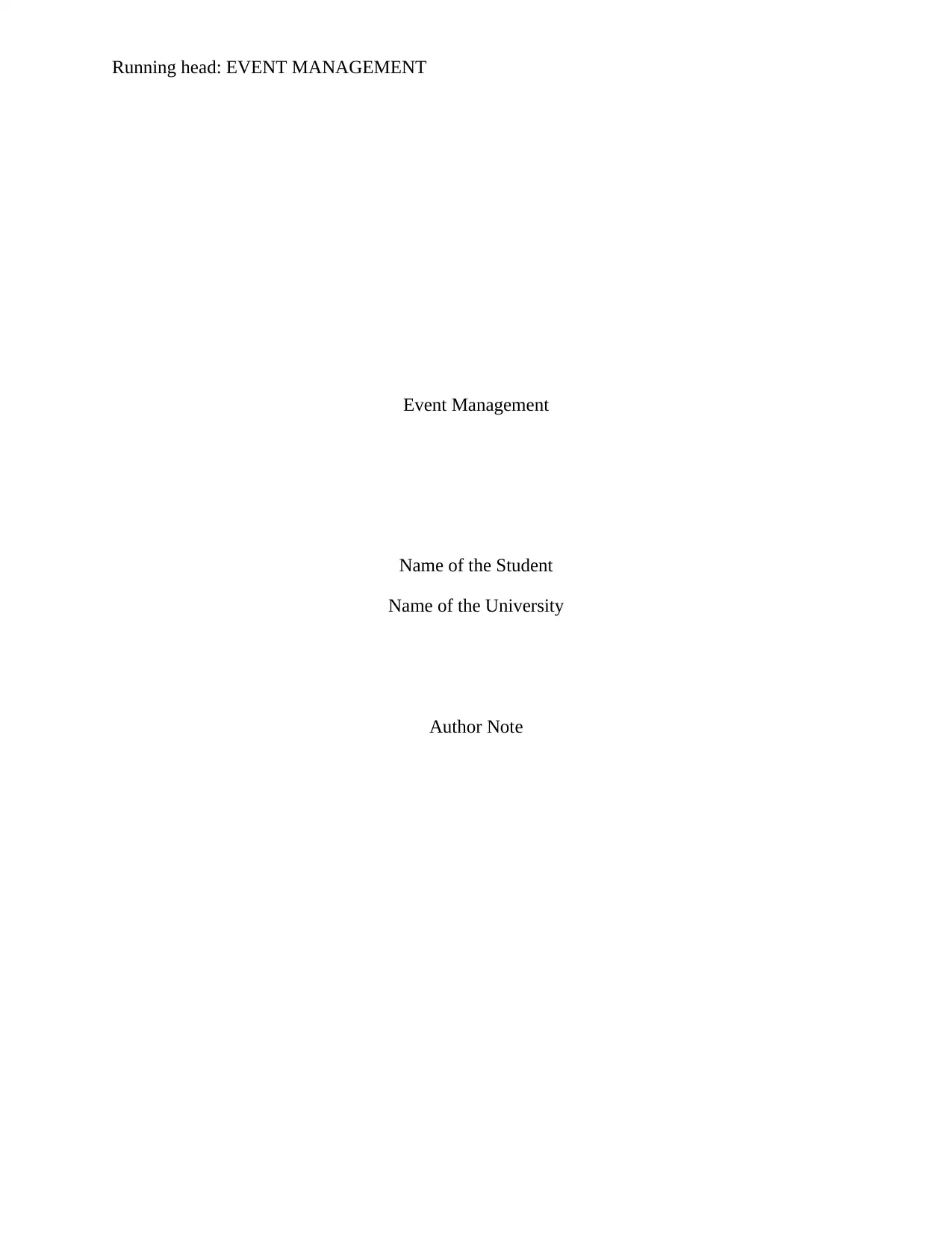
Running head: EVENT MANAGEMENT
Event Management
Name of the Student
Name of the University
Author Note
Event Management
Name of the Student
Name of the University
Author Note
Secure Best Marks with AI Grader
Need help grading? Try our AI Grader for instant feedback on your assignments.
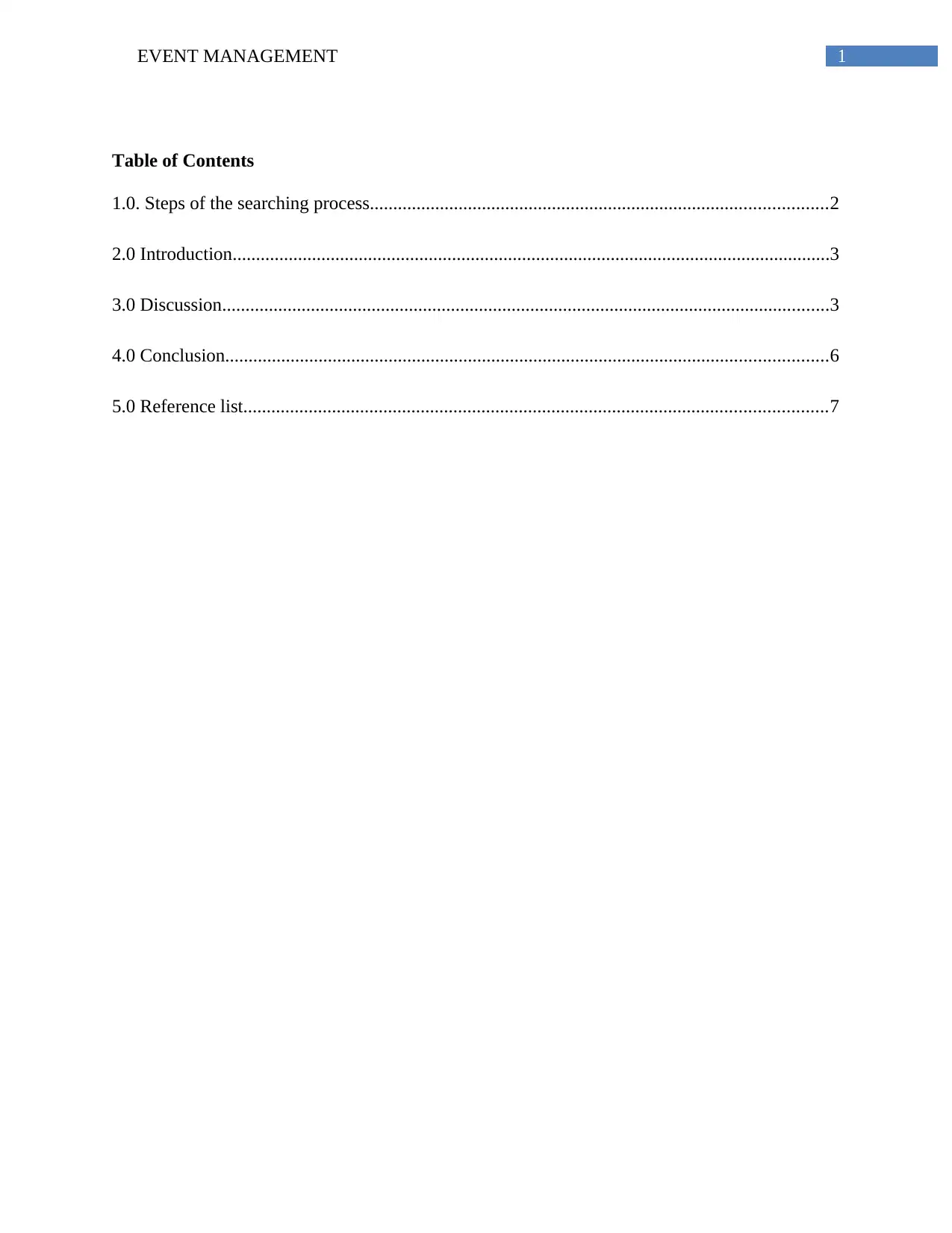
1EVENT MANAGEMENT
Table of Contents
1.0. Steps of the searching process..................................................................................................2
2.0 Introduction................................................................................................................................3
3.0 Discussion..................................................................................................................................3
4.0 Conclusion.................................................................................................................................6
5.0 Reference list.............................................................................................................................7
Table of Contents
1.0. Steps of the searching process..................................................................................................2
2.0 Introduction................................................................................................................................3
3.0 Discussion..................................................................................................................................3
4.0 Conclusion.................................................................................................................................6
5.0 Reference list.............................................................................................................................7
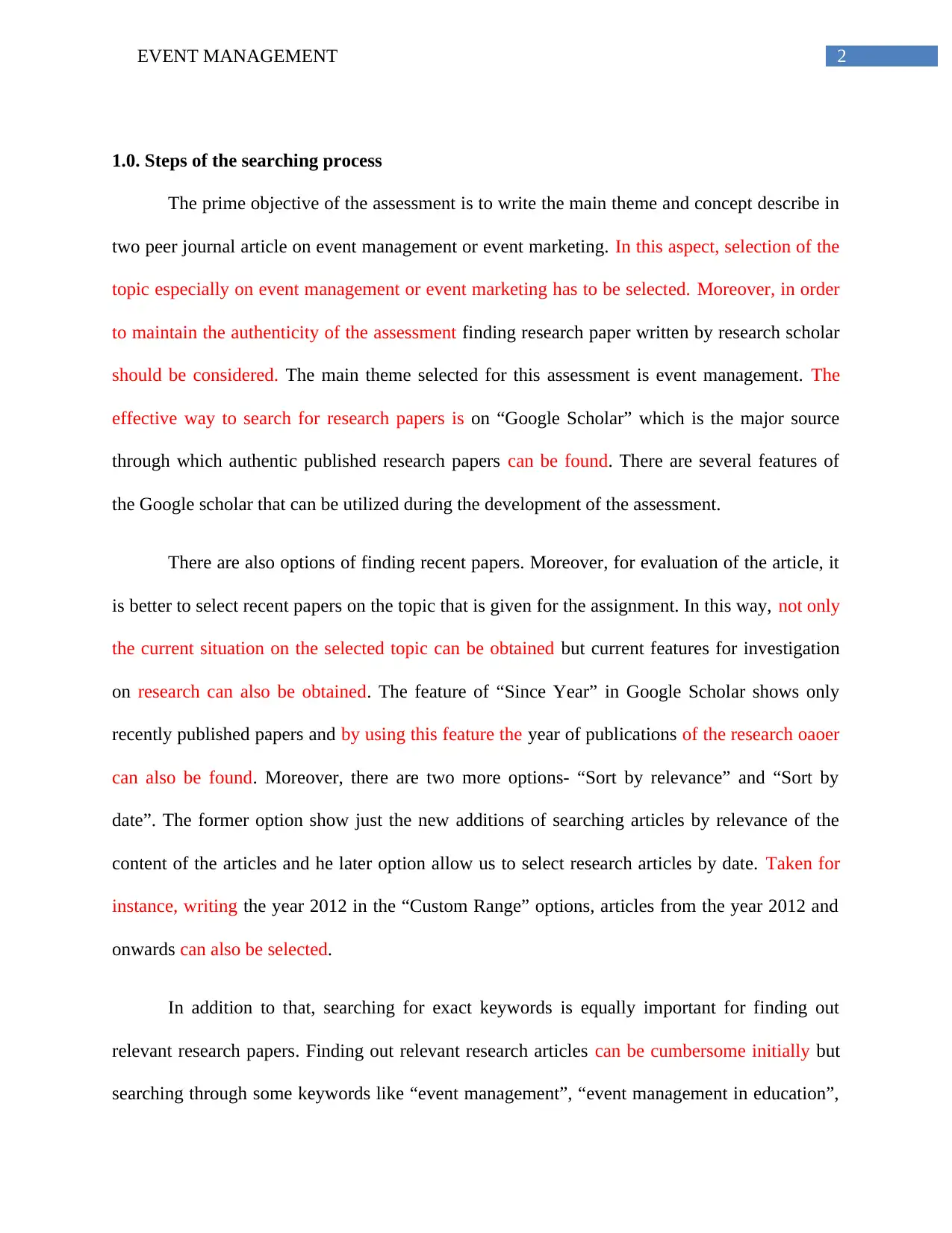
2EVENT MANAGEMENT
1.0. Steps of the searching process
The prime objective of the assessment is to write the main theme and concept describe in
two peer journal article on event management or event marketing. In this aspect, selection of the
topic especially on event management or event marketing has to be selected. Moreover, in order
to maintain the authenticity of the assessment finding research paper written by research scholar
should be considered. The main theme selected for this assessment is event management. The
effective way to search for research papers is on “Google Scholar” which is the major source
through which authentic published research papers can be found. There are several features of
the Google scholar that can be utilized during the development of the assessment.
There are also options of finding recent papers. Moreover, for evaluation of the article, it
is better to select recent papers on the topic that is given for the assignment. In this way, not only
the current situation on the selected topic can be obtained but current features for investigation
on research can also be obtained. The feature of “Since Year” in Google Scholar shows only
recently published papers and by using this feature the year of publications of the research oaoer
can also be found. Moreover, there are two more options- “Sort by relevance” and “Sort by
date”. The former option show just the new additions of searching articles by relevance of the
content of the articles and he later option allow us to select research articles by date. Taken for
instance, writing the year 2012 in the “Custom Range” options, articles from the year 2012 and
onwards can also be selected.
In addition to that, searching for exact keywords is equally important for finding out
relevant research papers. Finding out relevant research articles can be cumbersome initially but
searching through some keywords like “event management”, “event management in education”,
1.0. Steps of the searching process
The prime objective of the assessment is to write the main theme and concept describe in
two peer journal article on event management or event marketing. In this aspect, selection of the
topic especially on event management or event marketing has to be selected. Moreover, in order
to maintain the authenticity of the assessment finding research paper written by research scholar
should be considered. The main theme selected for this assessment is event management. The
effective way to search for research papers is on “Google Scholar” which is the major source
through which authentic published research papers can be found. There are several features of
the Google scholar that can be utilized during the development of the assessment.
There are also options of finding recent papers. Moreover, for evaluation of the article, it
is better to select recent papers on the topic that is given for the assignment. In this way, not only
the current situation on the selected topic can be obtained but current features for investigation
on research can also be obtained. The feature of “Since Year” in Google Scholar shows only
recently published papers and by using this feature the year of publications of the research oaoer
can also be found. Moreover, there are two more options- “Sort by relevance” and “Sort by
date”. The former option show just the new additions of searching articles by relevance of the
content of the articles and he later option allow us to select research articles by date. Taken for
instance, writing the year 2012 in the “Custom Range” options, articles from the year 2012 and
onwards can also be selected.
In addition to that, searching for exact keywords is equally important for finding out
relevant research papers. Finding out relevant research articles can be cumbersome initially but
searching through some keywords like “event management”, “event management in education”,
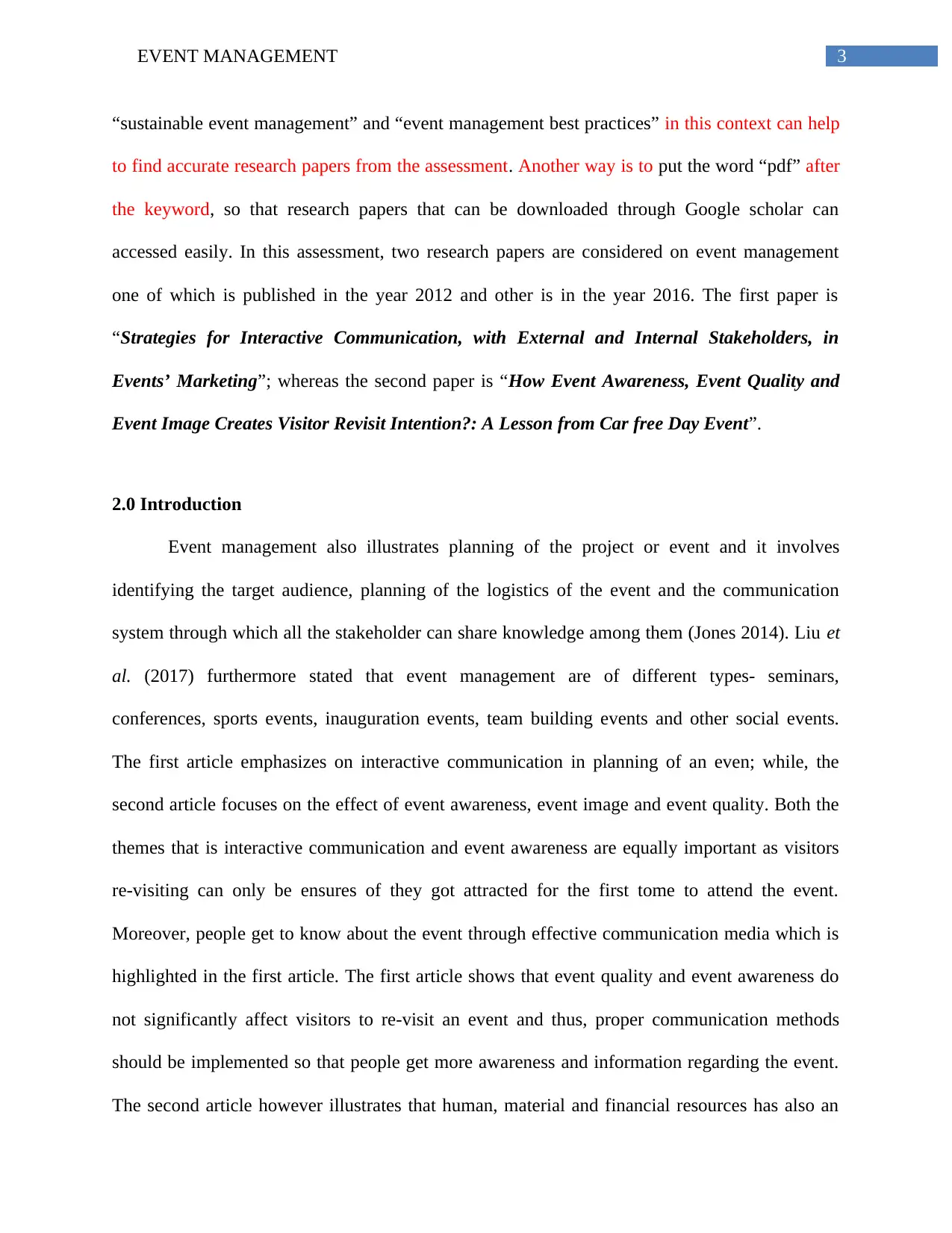
3EVENT MANAGEMENT
“sustainable event management” and “event management best practices” in this context can help
to find accurate research papers from the assessment. Another way is to put the word “pdf” after
the keyword, so that research papers that can be downloaded through Google scholar can
accessed easily. In this assessment, two research papers are considered on event management
one of which is published in the year 2012 and other is in the year 2016. The first paper is
“Strategies for Interactive Communication, with External and Internal Stakeholders, in
Events’ Marketing”; whereas the second paper is “How Event Awareness, Event Quality and
Event Image Creates Visitor Revisit Intention?: A Lesson from Car free Day Event”.
2.0 Introduction
Event management also illustrates planning of the project or event and it involves
identifying the target audience, planning of the logistics of the event and the communication
system through which all the stakeholder can share knowledge among them (Jones 2014). Liu et
al. (2017) furthermore stated that event management are of different types- seminars,
conferences, sports events, inauguration events, team building events and other social events.
The first article emphasizes on interactive communication in planning of an even; while, the
second article focuses on the effect of event awareness, event image and event quality. Both the
themes that is interactive communication and event awareness are equally important as visitors
re-visiting can only be ensures of they got attracted for the first tome to attend the event.
Moreover, people get to know about the event through effective communication media which is
highlighted in the first article. The first article shows that event quality and event awareness do
not significantly affect visitors to re-visit an event and thus, proper communication methods
should be implemented so that people get more awareness and information regarding the event.
The second article however illustrates that human, material and financial resources has also an
“sustainable event management” and “event management best practices” in this context can help
to find accurate research papers from the assessment. Another way is to put the word “pdf” after
the keyword, so that research papers that can be downloaded through Google scholar can
accessed easily. In this assessment, two research papers are considered on event management
one of which is published in the year 2012 and other is in the year 2016. The first paper is
“Strategies for Interactive Communication, with External and Internal Stakeholders, in
Events’ Marketing”; whereas the second paper is “How Event Awareness, Event Quality and
Event Image Creates Visitor Revisit Intention?: A Lesson from Car free Day Event”.
2.0 Introduction
Event management also illustrates planning of the project or event and it involves
identifying the target audience, planning of the logistics of the event and the communication
system through which all the stakeholder can share knowledge among them (Jones 2014). Liu et
al. (2017) furthermore stated that event management are of different types- seminars,
conferences, sports events, inauguration events, team building events and other social events.
The first article emphasizes on interactive communication in planning of an even; while, the
second article focuses on the effect of event awareness, event image and event quality. Both the
themes that is interactive communication and event awareness are equally important as visitors
re-visiting can only be ensures of they got attracted for the first tome to attend the event.
Moreover, people get to know about the event through effective communication media which is
highlighted in the first article. The first article shows that event quality and event awareness do
not significantly affect visitors to re-visit an event and thus, proper communication methods
should be implemented so that people get more awareness and information regarding the event.
The second article however illustrates that human, material and financial resources has also an
Secure Best Marks with AI Grader
Need help grading? Try our AI Grader for instant feedback on your assignments.
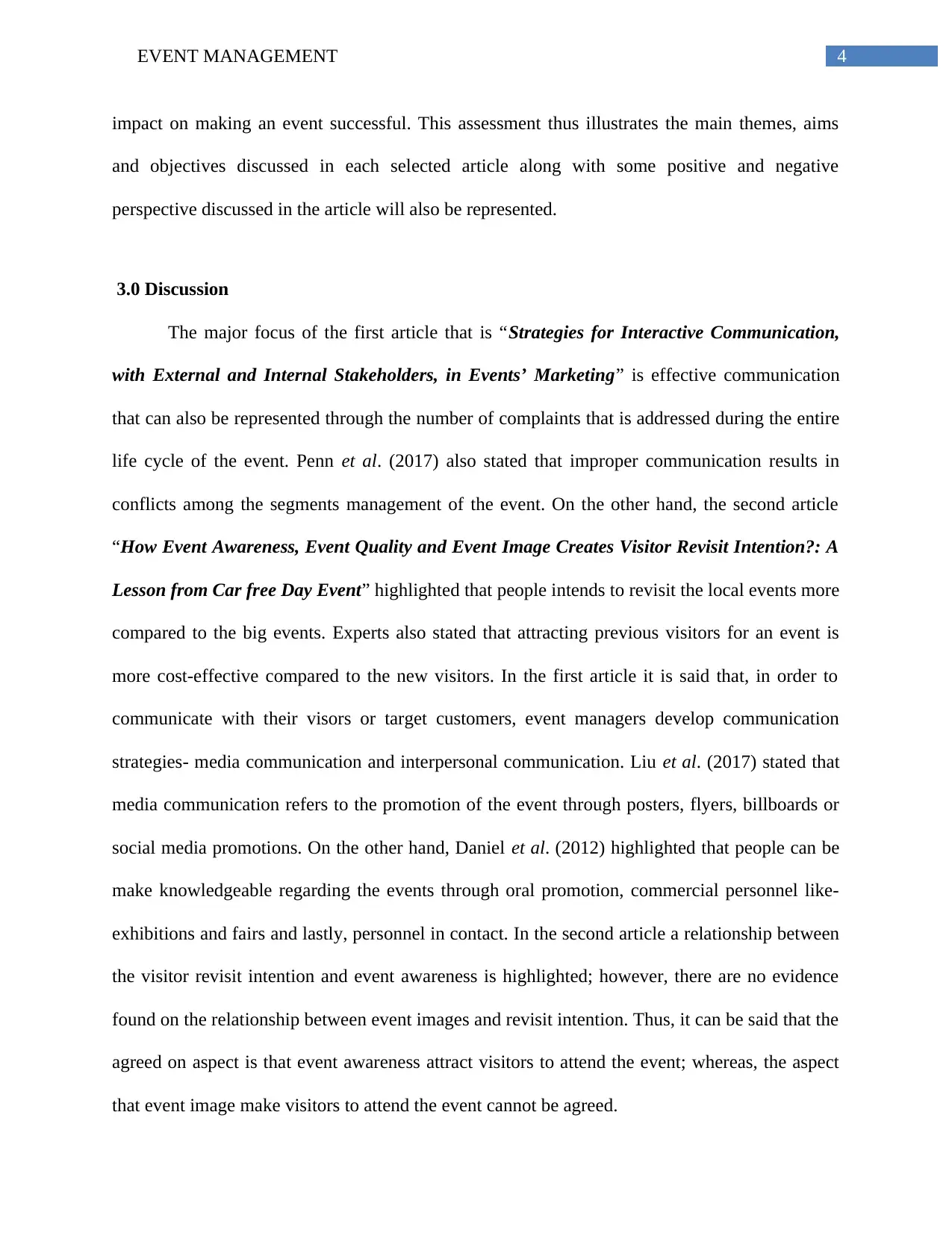
4EVENT MANAGEMENT
impact on making an event successful. This assessment thus illustrates the main themes, aims
and objectives discussed in each selected article along with some positive and negative
perspective discussed in the article will also be represented.
3.0 Discussion
The major focus of the first article that is “Strategies for Interactive Communication,
with External and Internal Stakeholders, in Events’ Marketing” is effective communication
that can also be represented through the number of complaints that is addressed during the entire
life cycle of the event. Penn et al. (2017) also stated that improper communication results in
conflicts among the segments management of the event. On the other hand, the second article
“How Event Awareness, Event Quality and Event Image Creates Visitor Revisit Intention?: A
Lesson from Car free Day Event” highlighted that people intends to revisit the local events more
compared to the big events. Experts also stated that attracting previous visitors for an event is
more cost-effective compared to the new visitors. In the first article it is said that, in order to
communicate with their visors or target customers, event managers develop communication
strategies- media communication and interpersonal communication. Liu et al. (2017) stated that
media communication refers to the promotion of the event through posters, flyers, billboards or
social media promotions. On the other hand, Daniel et al. (2012) highlighted that people can be
make knowledgeable regarding the events through oral promotion, commercial personnel like-
exhibitions and fairs and lastly, personnel in contact. In the second article a relationship between
the visitor revisit intention and event awareness is highlighted; however, there are no evidence
found on the relationship between event images and revisit intention. Thus, it can be said that the
agreed on aspect is that event awareness attract visitors to attend the event; whereas, the aspect
that event image make visitors to attend the event cannot be agreed.
impact on making an event successful. This assessment thus illustrates the main themes, aims
and objectives discussed in each selected article along with some positive and negative
perspective discussed in the article will also be represented.
3.0 Discussion
The major focus of the first article that is “Strategies for Interactive Communication,
with External and Internal Stakeholders, in Events’ Marketing” is effective communication
that can also be represented through the number of complaints that is addressed during the entire
life cycle of the event. Penn et al. (2017) also stated that improper communication results in
conflicts among the segments management of the event. On the other hand, the second article
“How Event Awareness, Event Quality and Event Image Creates Visitor Revisit Intention?: A
Lesson from Car free Day Event” highlighted that people intends to revisit the local events more
compared to the big events. Experts also stated that attracting previous visitors for an event is
more cost-effective compared to the new visitors. In the first article it is said that, in order to
communicate with their visors or target customers, event managers develop communication
strategies- media communication and interpersonal communication. Liu et al. (2017) stated that
media communication refers to the promotion of the event through posters, flyers, billboards or
social media promotions. On the other hand, Daniel et al. (2012) highlighted that people can be
make knowledgeable regarding the events through oral promotion, commercial personnel like-
exhibitions and fairs and lastly, personnel in contact. In the second article a relationship between
the visitor revisit intention and event awareness is highlighted; however, there are no evidence
found on the relationship between event images and revisit intention. Thus, it can be said that the
agreed on aspect is that event awareness attract visitors to attend the event; whereas, the aspect
that event image make visitors to attend the event cannot be agreed.
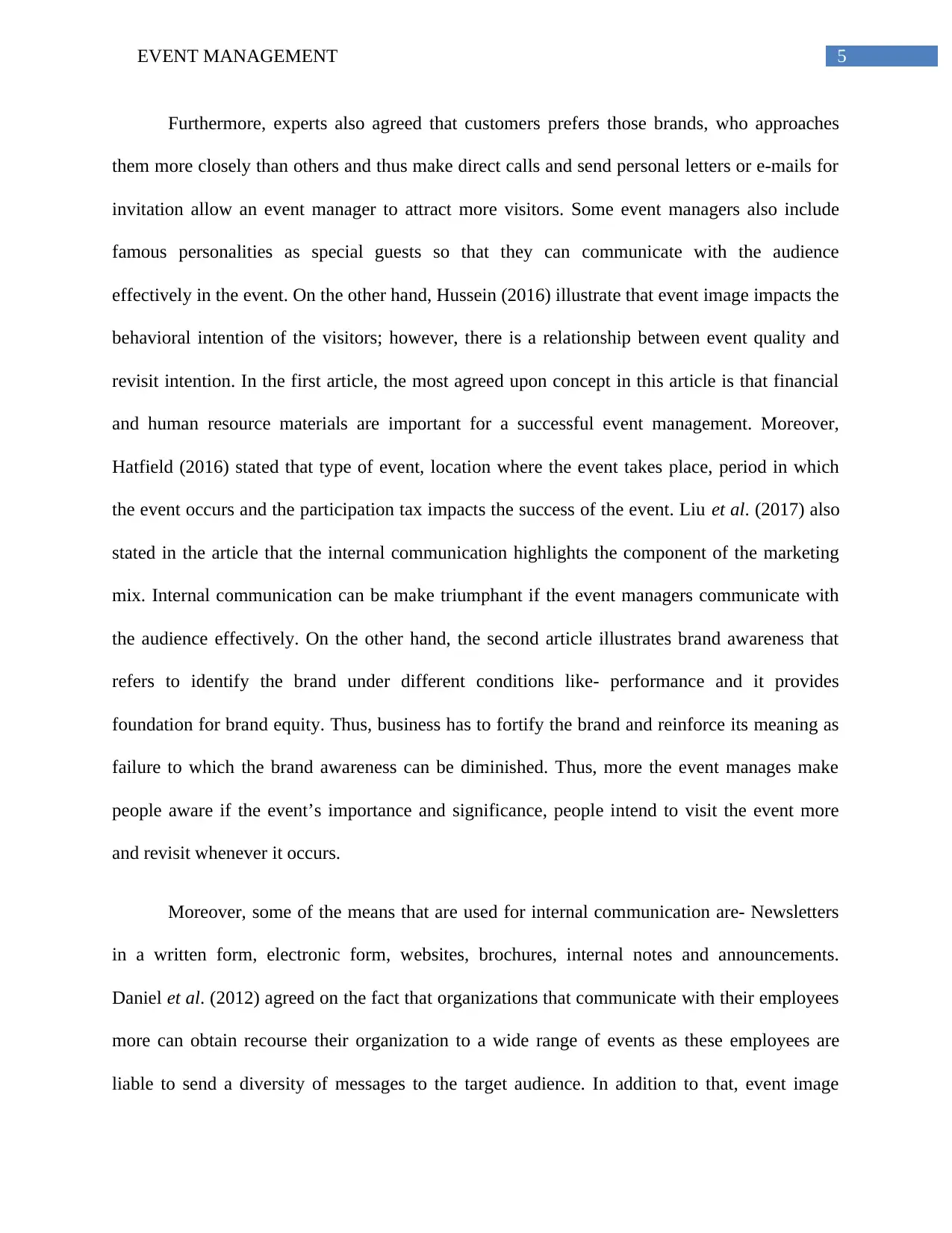
5EVENT MANAGEMENT
Furthermore, experts also agreed that customers prefers those brands, who approaches
them more closely than others and thus make direct calls and send personal letters or e-mails for
invitation allow an event manager to attract more visitors. Some event managers also include
famous personalities as special guests so that they can communicate with the audience
effectively in the event. On the other hand, Hussein (2016) illustrate that event image impacts the
behavioral intention of the visitors; however, there is a relationship between event quality and
revisit intention. In the first article, the most agreed upon concept in this article is that financial
and human resource materials are important for a successful event management. Moreover,
Hatfield (2016) stated that type of event, location where the event takes place, period in which
the event occurs and the participation tax impacts the success of the event. Liu et al. (2017) also
stated in the article that the internal communication highlights the component of the marketing
mix. Internal communication can be make triumphant if the event managers communicate with
the audience effectively. On the other hand, the second article illustrates brand awareness that
refers to identify the brand under different conditions like- performance and it provides
foundation for brand equity. Thus, business has to fortify the brand and reinforce its meaning as
failure to which the brand awareness can be diminished. Thus, more the event manages make
people aware if the event’s importance and significance, people intend to visit the event more
and revisit whenever it occurs.
Moreover, some of the means that are used for internal communication are- Newsletters
in a written form, electronic form, websites, brochures, internal notes and announcements.
Daniel et al. (2012) agreed on the fact that organizations that communicate with their employees
more can obtain recourse their organization to a wide range of events as these employees are
liable to send a diversity of messages to the target audience. In addition to that, event image
Furthermore, experts also agreed that customers prefers those brands, who approaches
them more closely than others and thus make direct calls and send personal letters or e-mails for
invitation allow an event manager to attract more visitors. Some event managers also include
famous personalities as special guests so that they can communicate with the audience
effectively in the event. On the other hand, Hussein (2016) illustrate that event image impacts the
behavioral intention of the visitors; however, there is a relationship between event quality and
revisit intention. In the first article, the most agreed upon concept in this article is that financial
and human resource materials are important for a successful event management. Moreover,
Hatfield (2016) stated that type of event, location where the event takes place, period in which
the event occurs and the participation tax impacts the success of the event. Liu et al. (2017) also
stated in the article that the internal communication highlights the component of the marketing
mix. Internal communication can be make triumphant if the event managers communicate with
the audience effectively. On the other hand, the second article illustrates brand awareness that
refers to identify the brand under different conditions like- performance and it provides
foundation for brand equity. Thus, business has to fortify the brand and reinforce its meaning as
failure to which the brand awareness can be diminished. Thus, more the event manages make
people aware if the event’s importance and significance, people intend to visit the event more
and revisit whenever it occurs.
Moreover, some of the means that are used for internal communication are- Newsletters
in a written form, electronic form, websites, brochures, internal notes and announcements.
Daniel et al. (2012) agreed on the fact that organizations that communicate with their employees
more can obtain recourse their organization to a wide range of events as these employees are
liable to send a diversity of messages to the target audience. In addition to that, event image
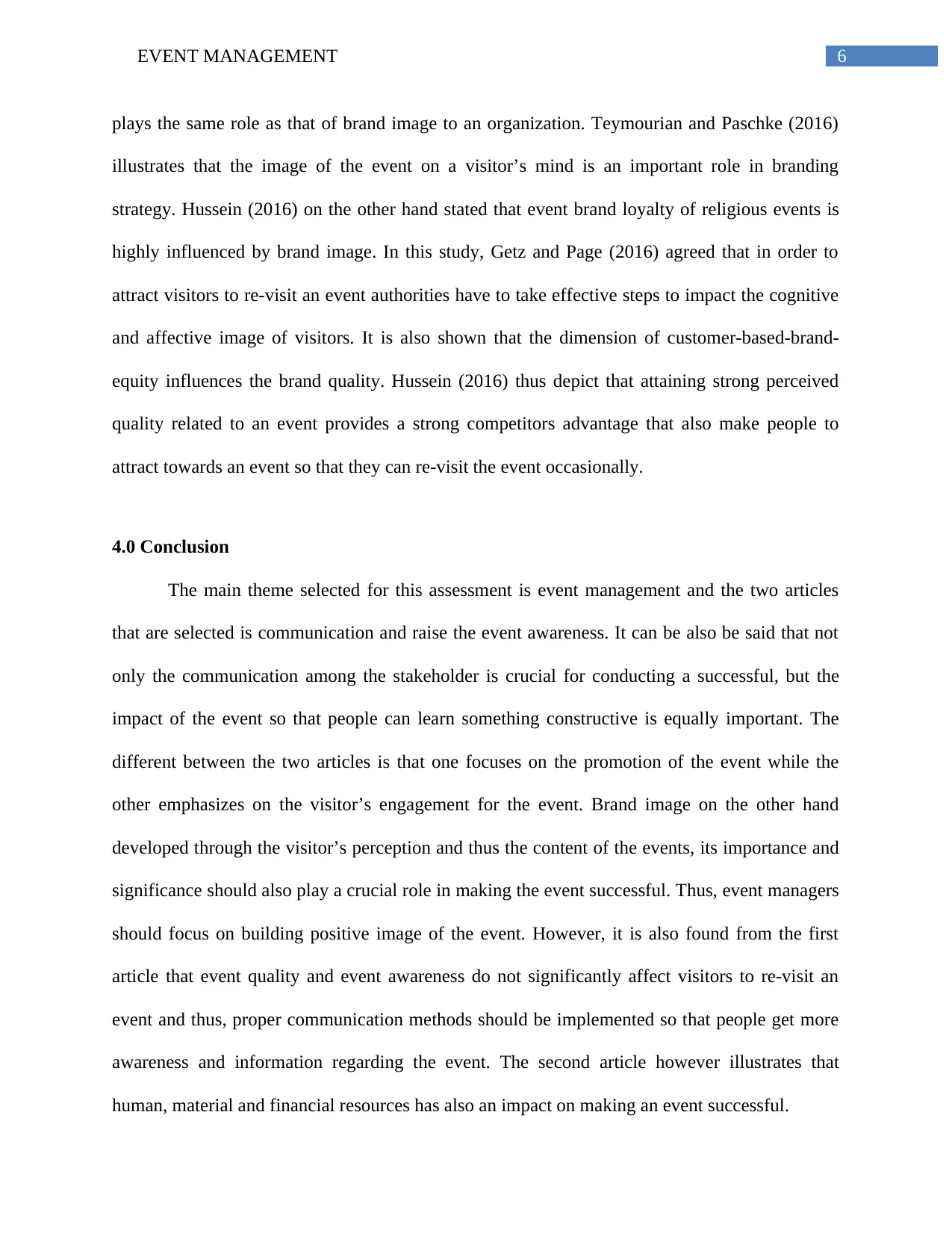
6EVENT MANAGEMENT
plays the same role as that of brand image to an organization. Teymourian and Paschke (2016)
illustrates that the image of the event on a visitor’s mind is an important role in branding
strategy. Hussein (2016) on the other hand stated that event brand loyalty of religious events is
highly influenced by brand image. In this study, Getz and Page (2016) agreed that in order to
attract visitors to re-visit an event authorities have to take effective steps to impact the cognitive
and affective image of visitors. It is also shown that the dimension of customer-based-brand-
equity influences the brand quality. Hussein (2016) thus depict that attaining strong perceived
quality related to an event provides a strong competitors advantage that also make people to
attract towards an event so that they can re-visit the event occasionally.
4.0 Conclusion
The main theme selected for this assessment is event management and the two articles
that are selected is communication and raise the event awareness. It can be also be said that not
only the communication among the stakeholder is crucial for conducting a successful, but the
impact of the event so that people can learn something constructive is equally important. The
different between the two articles is that one focuses on the promotion of the event while the
other emphasizes on the visitor’s engagement for the event. Brand image on the other hand
developed through the visitor’s perception and thus the content of the events, its importance and
significance should also play a crucial role in making the event successful. Thus, event managers
should focus on building positive image of the event. However, it is also found from the first
article that event quality and event awareness do not significantly affect visitors to re-visit an
event and thus, proper communication methods should be implemented so that people get more
awareness and information regarding the event. The second article however illustrates that
human, material and financial resources has also an impact on making an event successful.
plays the same role as that of brand image to an organization. Teymourian and Paschke (2016)
illustrates that the image of the event on a visitor’s mind is an important role in branding
strategy. Hussein (2016) on the other hand stated that event brand loyalty of religious events is
highly influenced by brand image. In this study, Getz and Page (2016) agreed that in order to
attract visitors to re-visit an event authorities have to take effective steps to impact the cognitive
and affective image of visitors. It is also shown that the dimension of customer-based-brand-
equity influences the brand quality. Hussein (2016) thus depict that attaining strong perceived
quality related to an event provides a strong competitors advantage that also make people to
attract towards an event so that they can re-visit the event occasionally.
4.0 Conclusion
The main theme selected for this assessment is event management and the two articles
that are selected is communication and raise the event awareness. It can be also be said that not
only the communication among the stakeholder is crucial for conducting a successful, but the
impact of the event so that people can learn something constructive is equally important. The
different between the two articles is that one focuses on the promotion of the event while the
other emphasizes on the visitor’s engagement for the event. Brand image on the other hand
developed through the visitor’s perception and thus the content of the events, its importance and
significance should also play a crucial role in making the event successful. Thus, event managers
should focus on building positive image of the event. However, it is also found from the first
article that event quality and event awareness do not significantly affect visitors to re-visit an
event and thus, proper communication methods should be implemented so that people get more
awareness and information regarding the event. The second article however illustrates that
human, material and financial resources has also an impact on making an event successful.
Paraphrase This Document
Need a fresh take? Get an instant paraphrase of this document with our AI Paraphraser
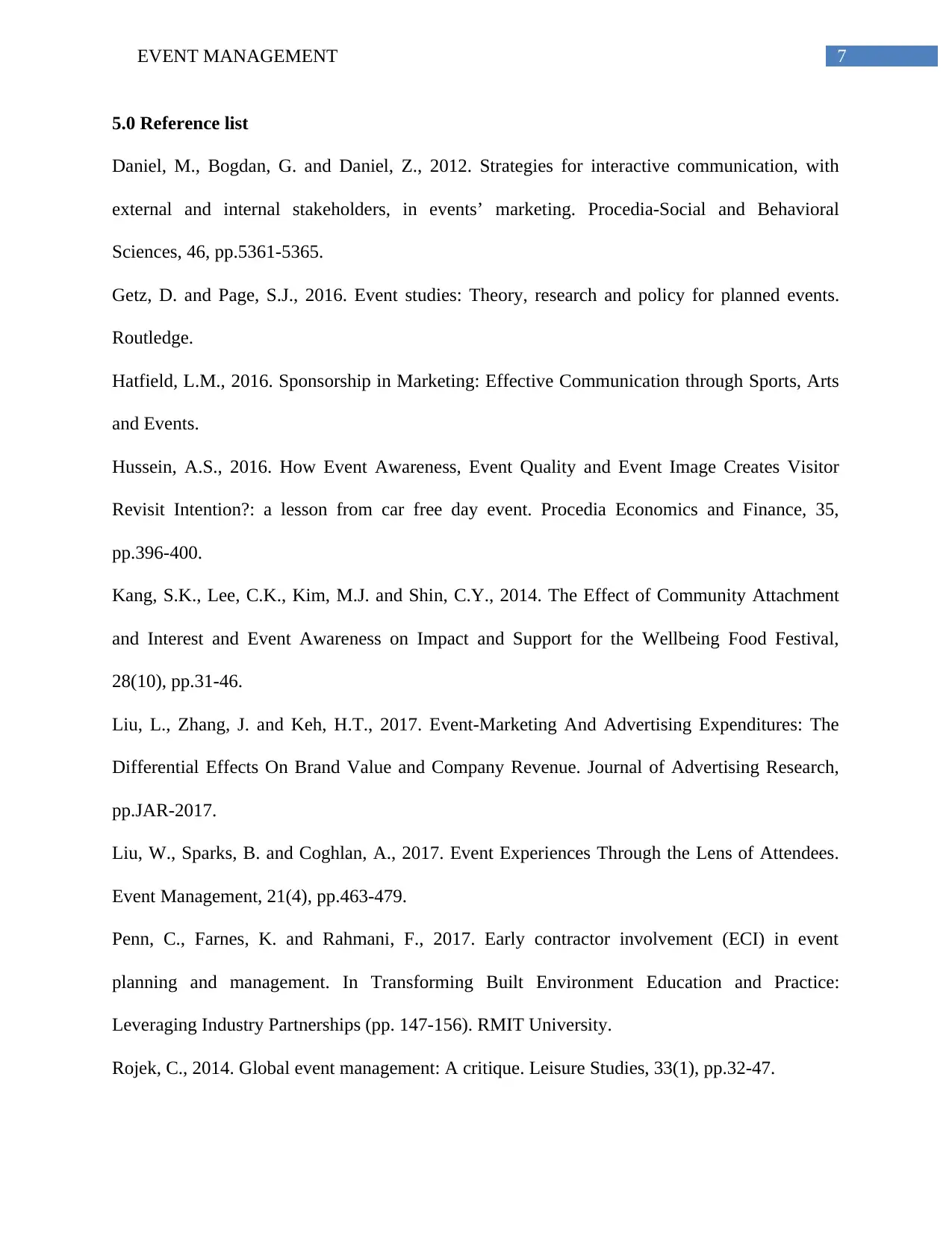
7EVENT MANAGEMENT
5.0 Reference list
Daniel, M., Bogdan, G. and Daniel, Z., 2012. Strategies for interactive communication, with
external and internal stakeholders, in events’ marketing. Procedia-Social and Behavioral
Sciences, 46, pp.5361-5365.
Getz, D. and Page, S.J., 2016. Event studies: Theory, research and policy for planned events.
Routledge.
Hatfield, L.M., 2016. Sponsorship in Marketing: Effective Communication through Sports, Arts
and Events.
Hussein, A.S., 2016. How Event Awareness, Event Quality and Event Image Creates Visitor
Revisit Intention?: a lesson from car free day event. Procedia Economics and Finance, 35,
pp.396-400.
Kang, S.K., Lee, C.K., Kim, M.J. and Shin, C.Y., 2014. The Effect of Community Attachment
and Interest and Event Awareness on Impact and Support for the Wellbeing Food Festival,
28(10), pp.31-46.
Liu, L., Zhang, J. and Keh, H.T., 2017. Event-Marketing And Advertising Expenditures: The
Differential Effects On Brand Value and Company Revenue. Journal of Advertising Research,
pp.JAR-2017.
Liu, W., Sparks, B. and Coghlan, A., 2017. Event Experiences Through the Lens of Attendees.
Event Management, 21(4), pp.463-479.
Penn, C., Farnes, K. and Rahmani, F., 2017. Early contractor involvement (ECI) in event
planning and management. In Transforming Built Environment Education and Practice:
Leveraging Industry Partnerships (pp. 147-156). RMIT University.
Rojek, C., 2014. Global event management: A critique. Leisure Studies, 33(1), pp.32-47.
5.0 Reference list
Daniel, M., Bogdan, G. and Daniel, Z., 2012. Strategies for interactive communication, with
external and internal stakeholders, in events’ marketing. Procedia-Social and Behavioral
Sciences, 46, pp.5361-5365.
Getz, D. and Page, S.J., 2016. Event studies: Theory, research and policy for planned events.
Routledge.
Hatfield, L.M., 2016. Sponsorship in Marketing: Effective Communication through Sports, Arts
and Events.
Hussein, A.S., 2016. How Event Awareness, Event Quality and Event Image Creates Visitor
Revisit Intention?: a lesson from car free day event. Procedia Economics and Finance, 35,
pp.396-400.
Kang, S.K., Lee, C.K., Kim, M.J. and Shin, C.Y., 2014. The Effect of Community Attachment
and Interest and Event Awareness on Impact and Support for the Wellbeing Food Festival,
28(10), pp.31-46.
Liu, L., Zhang, J. and Keh, H.T., 2017. Event-Marketing And Advertising Expenditures: The
Differential Effects On Brand Value and Company Revenue. Journal of Advertising Research,
pp.JAR-2017.
Liu, W., Sparks, B. and Coghlan, A., 2017. Event Experiences Through the Lens of Attendees.
Event Management, 21(4), pp.463-479.
Penn, C., Farnes, K. and Rahmani, F., 2017. Early contractor involvement (ECI) in event
planning and management. In Transforming Built Environment Education and Practice:
Leveraging Industry Partnerships (pp. 147-156). RMIT University.
Rojek, C., 2014. Global event management: A critique. Leisure Studies, 33(1), pp.32-47.
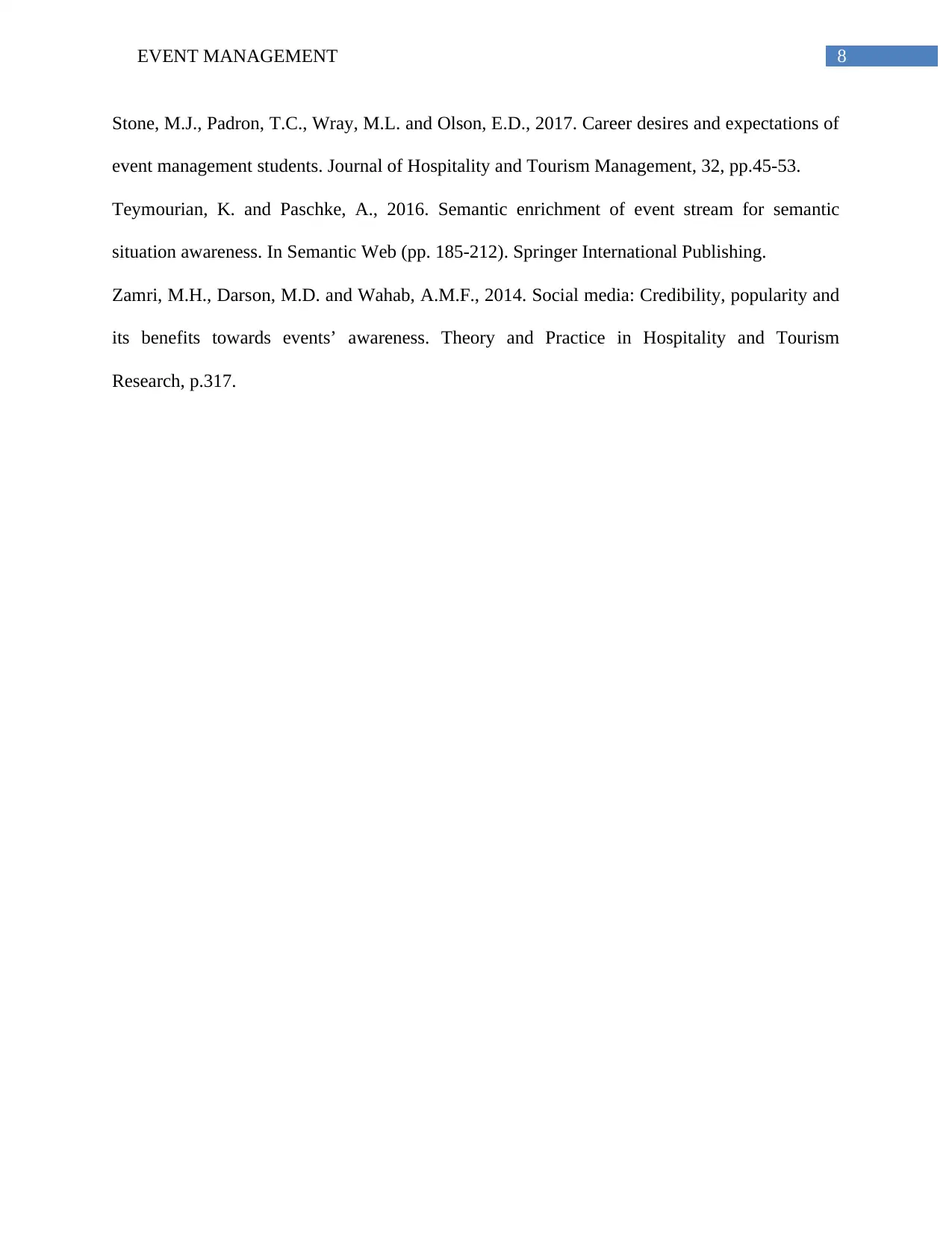
8EVENT MANAGEMENT
Stone, M.J., Padron, T.C., Wray, M.L. and Olson, E.D., 2017. Career desires and expectations of
event management students. Journal of Hospitality and Tourism Management, 32, pp.45-53.
Teymourian, K. and Paschke, A., 2016. Semantic enrichment of event stream for semantic
situation awareness. In Semantic Web (pp. 185-212). Springer International Publishing.
Zamri, M.H., Darson, M.D. and Wahab, A.M.F., 2014. Social media: Credibility, popularity and
its benefits towards events’ awareness. Theory and Practice in Hospitality and Tourism
Research, p.317.
Stone, M.J., Padron, T.C., Wray, M.L. and Olson, E.D., 2017. Career desires and expectations of
event management students. Journal of Hospitality and Tourism Management, 32, pp.45-53.
Teymourian, K. and Paschke, A., 2016. Semantic enrichment of event stream for semantic
situation awareness. In Semantic Web (pp. 185-212). Springer International Publishing.
Zamri, M.H., Darson, M.D. and Wahab, A.M.F., 2014. Social media: Credibility, popularity and
its benefits towards events’ awareness. Theory and Practice in Hospitality and Tourism
Research, p.317.
1 out of 9
Related Documents
Your All-in-One AI-Powered Toolkit for Academic Success.
+13062052269
info@desklib.com
Available 24*7 on WhatsApp / Email
![[object Object]](/_next/static/media/star-bottom.7253800d.svg)
Unlock your academic potential
© 2024 | Zucol Services PVT LTD | All rights reserved.





